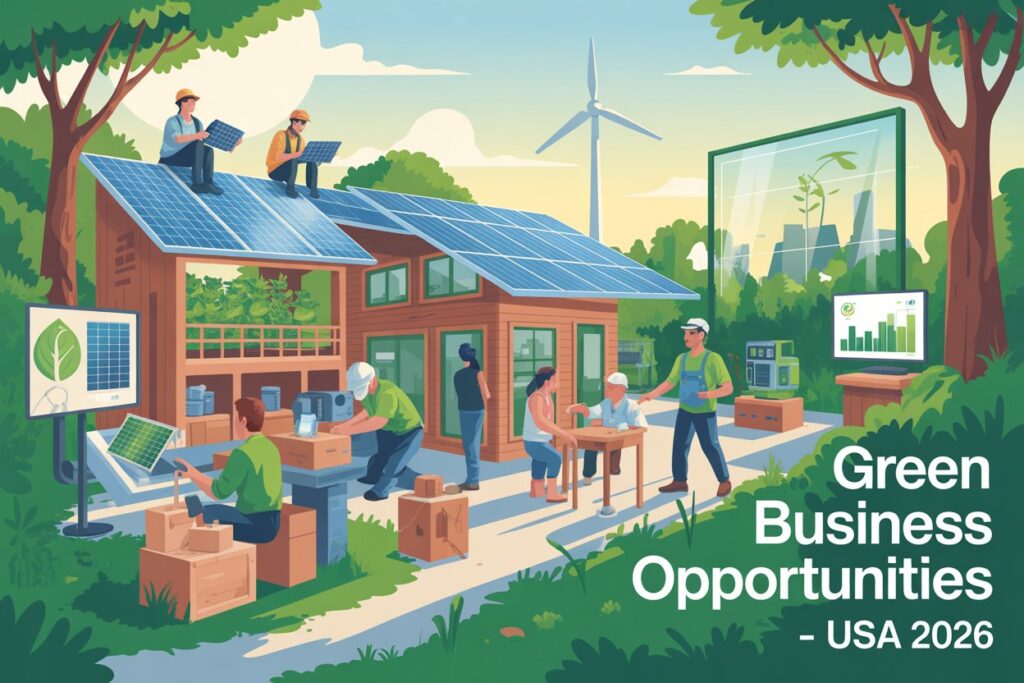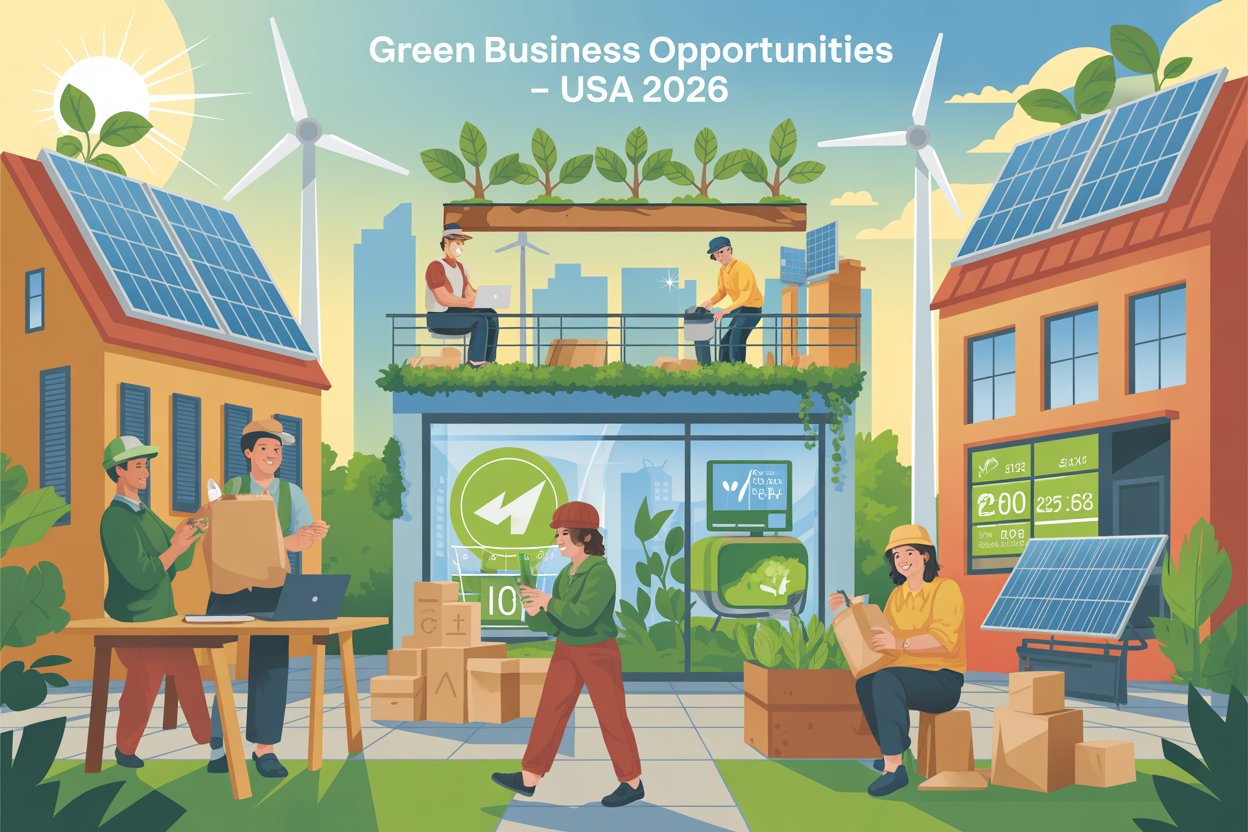Green Business Opportunities USA
Introduction to Green Business in the United States
In recent years, the United States has witnessed a transformative shift toward sustainability and eco-conscious entrepreneurship.
As climate change continues to impact global policies, green businesses—those that prioritize environmental protection and sustainability—are increasingly becoming essential to the economic and ecological fabric of the country.
By 2026, green business opportunities are expected to not only grow but thrive due to heightened consumer awareness, government incentives, and technological advancements.
This article explores green business opportunities in the USA, focusing on realistic, low-barrier entry ideas that align with both environmental values and strong profit potential.
What Is a Green Business?

A green business is any company that:
- Minimizes its environmental footprint
- Uses sustainable resources
- Offers products or services that benefit the planet
- Complies with green standards and environmental regulations
These businesses aim for both profitability and positive ecological impact.
Why Green Businesses Matter in 2026
Rising Consumer Demand
A growing segment of U.S. consumers prefer eco-friendly brands. People are becoming more aware of climate change, plastic pollution, and carbon emissions. According to recent surveys, over 60% of millennials are willing to pay more for sustainable products.
Government Incentives
Incentives like tax breaks, green grants, and renewable energy credits are offered at both federal and state levels. These reduce startup costs and encourage innovation.
Corporate Sustainability Mandates
Large corporations are adopting ESG (Environmental, Social, and Governance) standards, leading to new opportunities in green consulting, recycling partnerships, and supply chain optimization.
Top Green Business Opportunities in the USA
1. Solar Panel Installation and Maintenance
With solar energy adoption accelerating, starting a business that installs, repairs, or maintains solar panels is both impactful and profitable.
- Startup Cost: Moderate
- Skills Needed: Electrical knowledge, solar certification
- Growth Potential: High
2. Eco-Friendly Packaging Business
Start a business that manufactures or supplies biodegradable and compostable packaging solutions.
- Startup Cost: Low to Medium
- Target Audience: E-commerce stores, restaurants, and retailers
3. Green Cleaning Services
Eco-conscious consumers and companies want non-toxic cleaning services for homes and offices.
- Startup Cost: Low
- USP: Use of natural and organic cleaning products
4. Urban Gardening and Hydroponics
Help city dwellers grow their own food with hydroponic kits or rooftop gardening services.
- Market Trend: Rising food prices and urban living challenges
- Bonus: Can integrate with local schools and community programs
5. Sustainable Fashion Brand
Fast fashion is under scrutiny. Launch a small-scale brand using organic fabrics, recycled materials, or upcycled clothing.
- Niche: Gen Z and millennials
- Scalability: High with e-commerce platforms
6. Green Consulting Services
Help companies reduce their carbon footprint, adopt energy-saving methods, or become certified by environmental agencies.
- Requirements: Environmental science background, certifications
7. E-Waste Recycling Business
Offer collection and recycling of electronic waste like smartphones, laptops, and batteries.
- Startup Costs: Medium
- Revenue Model: Resell refurbished parts or recycle metals
8. Organic Farming or CSA (Community Supported Agriculture)
Grow and sell organic produce locally. Offer monthly subscription boxes.
- Market: Health-conscious and local-sourcing consumers
- Sustainability Edge: No chemical fertilizers or pesticides
Low-Cost Entry Green Business Ideas
1. Green Blogging or YouTube Channel
Create content focused on sustainability, zero-waste lifestyle, or green product reviews.
- Revenue Streams: Ads, affiliate marketing, sponsorships
- Cost: Minimal (just time, content creation tools)
2. Handmade Eco Products
Start a small Etsy store selling items like beeswax wraps, reusable bags, or upcycled decor.
- Tools Needed: Basic crafting materials, e-commerce platform
3. Digital Products for Green Living
Offer eBooks, printable checklists, or online courses on sustainable living.
- Benefits: Passive income, no inventory
Challenges to Consider
Compliance and Regulations
Some green industries are heavily regulated. Always research local, state, and federal laws.
Initial Awareness
Green products often need more education and explanation to sell. Budget for marketing and awareness campaigns.
Supply Chain Sourcing
Finding ethically sourced materials or suppliers may be more costly or time-consuming.
How to Start a Green Business in 2026
Step 1: Conduct Market Research
Identify demand, competitors, and profitability.
Step 2: Choose a Sustainable Business Model
Make sustainability the foundation—from packaging to delivery.
Step 3: Register and Certify Your Business
Register with state authorities and explore green certifications like:
- Green Business Bureau (GBB)
- Energy Star
- LEED certification
Step 4: Build an Online Presence
Use SEO, content marketing, and social media to promote your mission and products.
Step 5: Apply for Grants or Incentives
Look into:
- U.S. Small Business Administration (SBA) green grants
- Department of Energy funding
- Local green business incentives
Final Thoughts
Green business opportunities in the USA will continue to evolve, but one thing remains clear: sustainability is no longer a trend—it’s the future.
Whether you’re launching a low-cost eco-product line or offering corporate green consulting, the potential for growth is immense.
By entering the green business space in 2026, you not only contribute to a better planet but also position yourself at the forefront of an expanding and future-proof market.
FAQs About Green Business Opportunities
Q1. Do green businesses qualify for funding?
Yes. There are many federal and state-level grants and incentives.
Q2. Are green businesses profitable?
Absolutely. Many are low-cost to start and meet growing market demand.
Q3. Is green certification mandatory?
Not always. But it builds trust, credibility, and can open doors to more contracts or partnerships.






